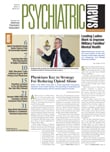Retired veteran journalist Robert MacNeil, who paired with Jim Lehrer to create the acclaimed "MacNeil/Lehrer Report" from 1975 until MacNeil's retirement in 1995, returned to PBS in April with a broad and thoughtful look at a psychiatric disorder that hits close to home for him.
In the first installment of a six-part series titled "Autism Now," MacNeil introduces viewers to his 6-year-old grandson, Nick, diagnosed with autism spectrum disorder (ASD) at age 15 months. For context, he also interviewed his daughter (Nick's mother, Alison MacNeil) and Nick's 10-year-old sister, Neely. It's an intimate picture of a family struggling to cope with a child's special needs.
MacNeil spent over a year researching and preparing the stories for the series, along with his producer, Caren Zucker, whose teenage son has autism.
The series continued with segments that individually address the prevalence, causes, available services (primarily educational), and adult support options (or the lack thereof) for those with ASD. The final segment is a roundtable discussion focusing on ways in which "this deepening national health emergency" can be addressed.
Perhaps the most disturbing segment is the fifth, in which MacNeil describes what he calls "a freight train about to run into the social-services system," the population of children with ASD who will soon outgrow the special services guaranteed to them by the public-education system. "For hundreds of thousands of adolescents with autism about to become adults, there are very few programs available. For those desperate to find a solution, it is a public-health crisis," said MacNeil in the segment.
One concern that has been voiced about the series is the lack of focus on the lives of adults with ASD. The Autistic Self Advocacy Network (ASAN), an organization that calls itself "the nation's leading advocacy organization run entirely by and for autistic adults and youth," released a statement expressing concern over the failure of the series to interview representatives of organizations run by autistic adults: "To pretend that any comprehensive account of autism is meaningful without substantively engaging with autistic people ourselves is disgraceful and offensive," said ASAN.
Zucker responded to those concerns in an interview with Psychiatric News: "There are hundreds of stories that I would love to start producing tomorrow, ranging from issues surrounding autism insurance laws, the scary fact that individuals with autism are being incarcerated rather than being evaluated and treated, to taking an in-depth look at the neurodiversity movement. We had a finite number of stories we could do for this series and tried to pick what we believed were the most comprehensive issues surrounding ‘what we know about autism today.’ We knew we would not have the airtime or financial resources to do everything."
"The response has been overwhelmingly positive, about 85 percent or so," added MacNeil. "The most common message is one of gratitude for such an extended and comprehensive look at so many autism issues and for making the diversity of autism behaviors so visible."
In an interview with Hari Sreenivasan after the series aired, MacNeil emphasized, "I don't pretend to be an expert; I'm a journalist," and he described his desire to chronicle "the growing impact of autism as seen through the eyes of families, children, educators, and clinicians."


